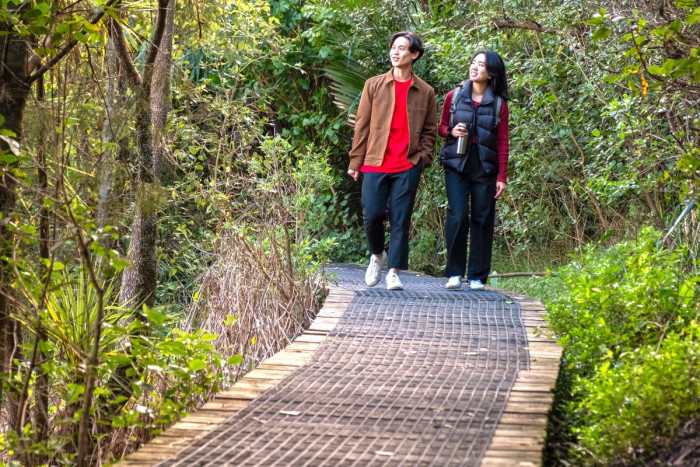Ranger
Āpiha Papa Atawhai
Alternative titles for this job
Rangers protect, enhance and maintain conservation and recreation areas such as regional and national parks, forests, wetlands, reserves, and sites of cultural importance.
Pay
New rangers usually earn
$47K-$60K per year
Experienced rangers usually earn
$53K-$93K per year
Source: DOC and Seek, 2023.
Job opportunities
Pay
Pay for rangers varies depending on experience, qualifications and the type of work they do.
- Park or maintenance rangers usually earn $55,000 to $65,000.
- Entry-level Department of Conservation (DOC) rangers usually earn $55,000 to $64,000.
- Senior DOC rangers or supervisors with more responsibilities can earn $77,000 to $97,000.
Sources: DOC website, 2023; and Seek, 2023.
(This information is a guide only. Find out more about the sources of our pay information)
What you will do
Rangers may do some or all of the following:
- monitor, manage and protect native wildlife, habitats and plants
- control and monitor pests and weeds, and run native plant nurseries
- patrol marine reserves and enforce compliance by-laws
- make or maintain tracks, toilets, huts, signs, fences
- keep park, reserve or campsite amenities clean, and remove rubbish
- protect and restore historic sites
- build and maintain links with the local community and iwi
- assist and give information to visitors of parks or reserves
- develop and oversee volunteer and education programmes
- support and monitor concession holders and property licence holders such as graziers.
Skills and knowledge
Rangers need to have some or all of the following:
- tramping and hiking experience and knowledge
- horticulture and pest control skills
- animal and bird-handling skills
- an understanding of legislation relevant to conservation work
- knowledge of New Zealand natural history, plants, animals and cultural issues
- knowledge of outdoor recreation
- building and track maintenance skills.
Working conditions
Rangers:
- usually work regular business hours, but may also work evenings and weekends
- work in offices and outdoors, in areas such as national or regional parks and wildlife reserves
- work outdoors in all weather conditions
- may have to travel to attend meetings or spend days away from home working in remote areas.
What's the job really like?

Jeremy Paterson
Park Ranger
Diversity in ranger jobs
"I think when you say park ranger a lot of people just think of someone maybe in DOC that's looking after a wilderness environment. We're on this urban fringe, near Wellington, and the issues are a lot different. We're dealing with the public a lot more. We've got so many neighbours. Being out in the wilderness you've got no neighbours. You're maintaining tracks and biodiversity, but here we're got a bit of everything."
Being the face of a park
"Being a park ranger is being the face of the place, being able to answer questions and being out there and talking to people when you're out and about. That's more of a thing with park rangers than anything."
What's an average week like for you?
"Most days I'll go to Dry Creek and check the camping area. That's the toilets, make sure they're clean, toilet paper is stocked up, pick up any rubbish. Then during the start of the month it's inspections and ranger reports. My week can start off completely free and then each day something else happens. I suppose our work is fairly reactionary. Being in the park ranger roles, if something needs to be fixed, we'll have to problem solve and get it fixed."
Meet the Locals: Trainee Ranger
Find out how you can become a DOC ranger! Trainee rangers learn how to look after locals in the Nelson/Tasman region.
Scott this isn't your average lecture theater what's this training range of course all about? it's a chance to get young ones out actually learning the skills of becoming a dockworker so they can get out and become DOC rangers and work for us. And what sorts of skills are they learning while they're on this course? ATVs, fire training, fencing, trapping, plant identification, it's just we just just pack it in.
And all of these students actually come from all throughout the country. They're coming from Kaitaia through the deep south from one from the Chatham's last year we just, theu basically come from all over the country. And what happens when they come out the other side of the course? Because these guys come out with all of their tickets, with their chainsaw ticket and their ATV ticket and their grow safe ticket they just get snapped up by the department. And what's the most rewarding thing for you? Watching them progress through the system, actually and going getting them becoming happy DOC workers, it's really cool I've got this whole network of training Rangers out there and I just love watching them progress and checking in on them. I'm a country girl born on a farm, I just want to be a part of preserving what New Zealand has to offer. I would like to end up on an island maybe Maud Island or somewhere in the south, maybe working with some of the birds, takahē, Kākāpō.
I'm here with Kelvin who's the course coordinator for the trainee Rangers he's going to show me how to tie a termination knot. Simply the terminations means termination where it stops at the fence, we turn the wire over like so, so you end up with a bent and it's nice and solid and won't go anywhere on you, because it's a very, wire that flicks a lot, you need to have that stability. So, effectively we just put that under there, pull that back up into there, slide that forward and then lift it up, right. Okay, so then you actually take it so, fold that round, put it into a crank, and then you wrap, okay, do about two to three wraps. come over, stop, come back, turn backwards and snap it off. Why do trainee Rangers need to learn about fencing? DOC has a huge estate that is protected by fencing keeping animals out and the last thing they need is a fence to fail.
I've had an amazing time out here with the trainee Rangers and if you're thinking of checking in your office job then maybe we've given you some food for thought. A Ranger's life isn't for everyone but for a dedicated bunch of people they really are living their dream job.
Entry requirements
There are no specific entry requirements to become a ranger, but a New Zealand Certificate in Conservation (Operations) (Level 4) may be useful.
You gain this qualification by completing the trainee ranger programme run by the Department of Conservation (DOC) at the Nelson Marlborough Institute of Technology (NMIT) or Toi Ohomai in the Bay of Plenty.
A relevant Bachelor of Science degree may also be useful. Tertiary students can major in parks and outdoor recreation at Lincoln University.
- Department of Conservation website - ranger qualifications
- Lincoln University website - qualifications in sport and recreation
Secondary education
There are no specific secondary education requirements to become a ranger. However, te reo Māori, biology, construction and mechanical technologies, geography, agricultural and horticultural science, and physical education are useful.
Personal requirements
Rangers need to be:
- adaptable and practical
- safety conscious
- able to remain calm in emergencies
- motivated, as they may have to work in difficult conditions, such as outdoors in bad weather
- able to work independently or as part of a team
- friendly, patient and helpful, as they deal with the public
- knowledgeable about first aid.
You have to be very self-motivated and enjoy working by yourself because a lot of the time you will be working alone.

Jeremy Paterson
Ranger
Useful experience
Useful experience for rangers includes:
- doing volunteer conservation work with a group
- taking online courses run by the Department of Conservation
- outdoor experience such as tramping, camping or farming
- First Aid Certificate and Risk Management Certificates
- building work
- experience with native birds and insects
- customer service.
A knowledge and understanding of Māori culture and protocol is also useful.
Physical requirements
Rangers need to have excellent fitness and health as the job involves working outdoors in all kinds of weather and in challenging locations.
Find out more about training
- Department of Conservation
- (04) 471 0726 - enquiries@doc.govt.nz - www.doc.govt.nz
What are the chances of getting a job?
Job opportunities for rangers best in remote areas
Demand for rangers is expected to grow due to a government increase in conservation funding.
There are often vacancies for Department of Conservation (DOC) ranger jobs, but competition can be strong. Your chances of securing a job are best if you apply for ones based in remote areas.
According to the Census, 981 park rangers worked in New Zealand in 2018.
Experience doing contract or volunteer work useful
You can improve your chances of securing a ranger job by volunteering for DOC or for council or community projects. Volunteering can lead to short or long-term contract work. Contract and volunteer work in the field is usually only available in summer.
Studying online courses through DOC may also help your chances of getting a job.
- Department of Conservation website - become a DOC volunteer
- Department of Conservation website - training
Most rangers work for DOC
The Department of Conservation (DOC) is the main employer of rangers. They can also work for:
- regional and local councils
- conservation sanctuaries
- Fish & Game New Zealand.
Sources
- Boness, W, principal ranger, Greater Wellington Regional Council, careers.govt.nz interview, June 2018.
- Endres, B, conservation co-ordinator, Nelson Marlborough Institute of Technology, careers.govt.nz interview, June 2018.
- Fuller, N, human resources senior adviser, Department of Conservation, careers.govt.nz interview, March 2018.
- Kelleher, R, biodiversity manager, Auckland Council, careers.govt.nz interview, July 2018.
- Stats NZ, '2018 Census Data', 2019.
(This information is a guide only. Find out more about the sources of our job opportunities information)
Progression and specialisations
Rangers may move into team leader or management roles.
Rangers can specialise in several areas, including:
- building, carpentry, or plumbing (needed for building huts and other visitor facilities at national and regional parks)
- community relations and education
- biodiversity, which involves looking after plants and animals.
Last updated 6 November 2023

